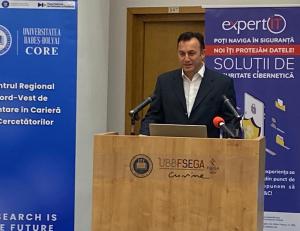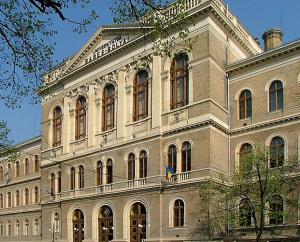In order to climb the world ranking, Babeș-Bolyai University from Cluj-Napoca aims at boosting scientific research through PhD students.
— Leonard Horvath, Director of UBB-CORE
CLUJ-NAPOCA, TRANSYLVANIA, ROMANIA, December 13, 2023 /EINPresswire.com/ — This year, no Romanian university is among the top 1,000 higher education institutions in the world, according to the Shanghai ranking. However, in the rankings by field, there are universities that continue to perform. And according to the national metaranking that summarises several relevant international rankings, Babeș-Bolyai University (UBB) in Cluj continues to rank first in Romania.
To stimulate their appetite for scientific research, the team of the North-West Regional Centre for Career Guidance of Researchers (UBB-CORE), conducted a study, entitled “Attitudes and motivations for the development of research careers among bachelor, master and PhD students”. Most relevant are the results concerning doctoral students, who took up scientific research activity with this status.
The premise of the UBB-CORE researchers is that scientific research is an important resource for the University of Cluj, “We want to use the data provided by this study to support the development of research skills, research scientist thinking and an attitude of valuing science among doctoral students,” says Prof. Leonard Horvath, Director of UBB-CORE.
He explains that in order to involve this category of students in research activity and to create a genuine commitment to this activity, it is essential to know the sources of motivation and attitudes towards the disciplines and academic tasks related to research.
Leonard Horvath initiated the study as part of a project funded through the NRRP, Investment 10 – Establishment and financial support of a national network of eight regional career guidance centres as part of ERA TALENT PLATFORM – Ministry of Research, Innovation and Digitisation. In practice, European funds were used to investigate the attitudes and perceptions of UBB PhD students regarding the personal and professional relevance of research. The aim of this study is to develop actions to facilitate educational and vocational pathways in research or, in other words, to help doctoral students achieve higher performance in their research activity.
The study included 73 PhD students. Of these, 28 are men and 45 are women. The average age is 31.1 years. They study in fields such as economics, social sciences, humanities, mathematics and natural sciences.
At the time of the survey, 45.8 percent of PhD students had not published any articles in Web of Science journals and 54.2 percent had published at least one article in such journals. According to another criterion, 47.2 percent of PhD students had not published any articles in BDI-indexed journals, and the rest had published 1-2 articles per PhD student. Most of the PhD students who participated in the study work in universities, but only a few of them have received researcher or research assistant positions.
Three motivational profiles of PhD students
The first is the group of intrinsically motivated PhD students, consisting of 35 individuals. For them, research is an important part of their career goals and values. They find the research activity interesting in itself. UBB-CORE specialists recommend constant involvement in research activities in areas that are in line with their own interests and values.
The second group consists of 16 doctoral students with low research motivation. They do not find the usefulness of research in relation to the values and goals relevant to them, nor do they wish to receive recognition or material rewards from this activity. The recommendation for this group of people is to further explore their individual perceptions of research and to provide external motivators, contexts for social validation and identification of the relevance of research to their profession.
The third group consists of 22 PhD students with a priority external motivation for research. They are socially and materially motivated to carry out scientific research. Sometimes the research activity is also a source of self-esteem or positive emotions. These PhD students are very sensitive to the opinions of others about their research performance, are motivated by recognition from them and avoidance of social penalties. Motivation also comes from the prospect of losing resources such as the loss of a PhD place, professional position or scholarship. The recommendation for this group of researchers is related to the use of external factors such as rewards/threat of social penalty to motivate them to continue their research activity, as well as emphasising those factors that generate positive emotions and self-esteem from the research activity. In this way, these doctoral students will be able to identify research topics and contexts that are congruent with their goals and in which they will find pleasure.
The study also showed that only 20.5% of PhD students perceive themselves as very competent in specific activities related to research design, implementation and presentation, 71% of PhD students perceive themselves as moderately competent and 12.3% perceive themselves as not very competent.
The same research also showed that doctoral students are very effective in tasks such as selecting and synthesising information from the literature, formulating research objectives and questions, and presenting research in writing. In contrast, they reported lower effectiveness on components of using data analysis software, preparing a manuscript for publication and presenting research results at scientific conferences, and working in a research team.
A particularly important element is the coordinator-doctoral candidate relationship. In practice, it is the most significant professional relationship during doctoral studies. This relationship directly influences motivation and commitment to the research activity.
The study conducted by UBB-CORE researchers revealed that 13.7 percent of doctoral students perceive the relationship with their supervisor to be low, 71 percent believe the relationship to be moderately effective, and 19.2 percent believe it to be high.
PADUREAN BIANCA CLUJ TODAY PRESS
Cluj Today Press SRL
email us here
Visit us on social media:
Facebook
![]()
Originally published at https://www.einpresswire.com/article/674830944/how-ubb-cluj-napoca-encourages-students-to-get-involved-in-scientific-research






